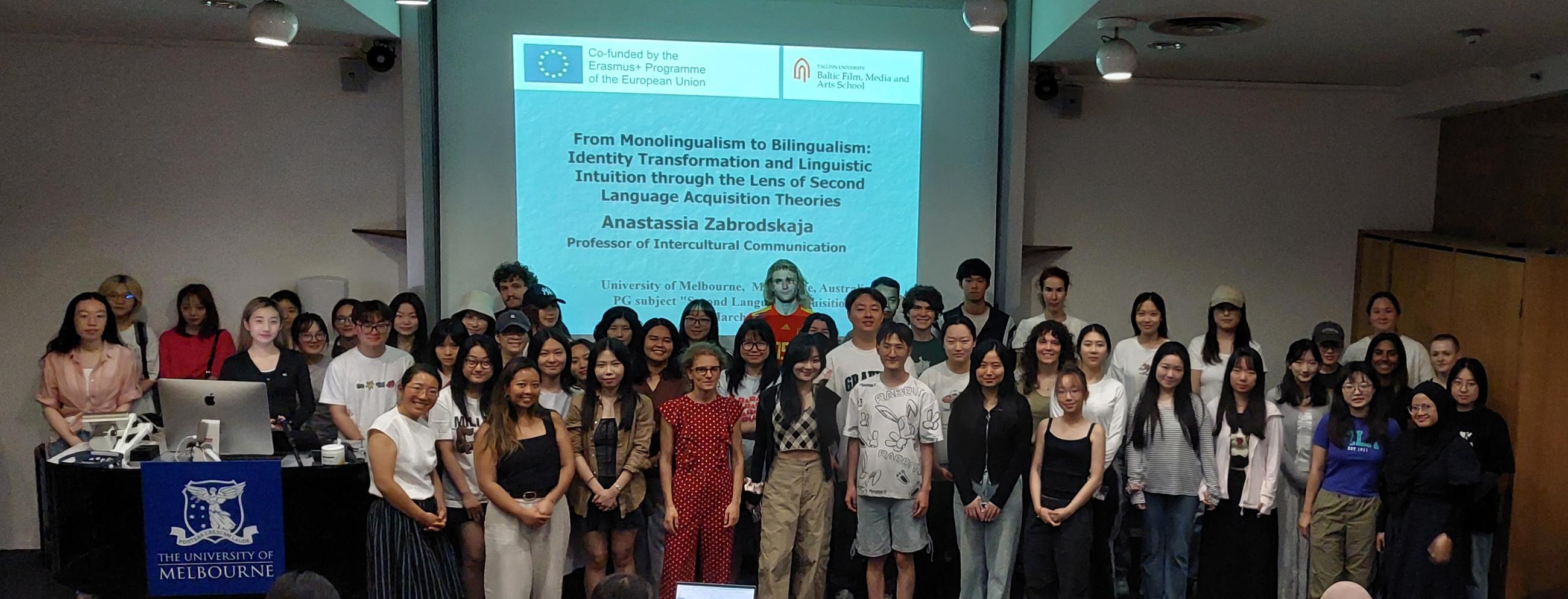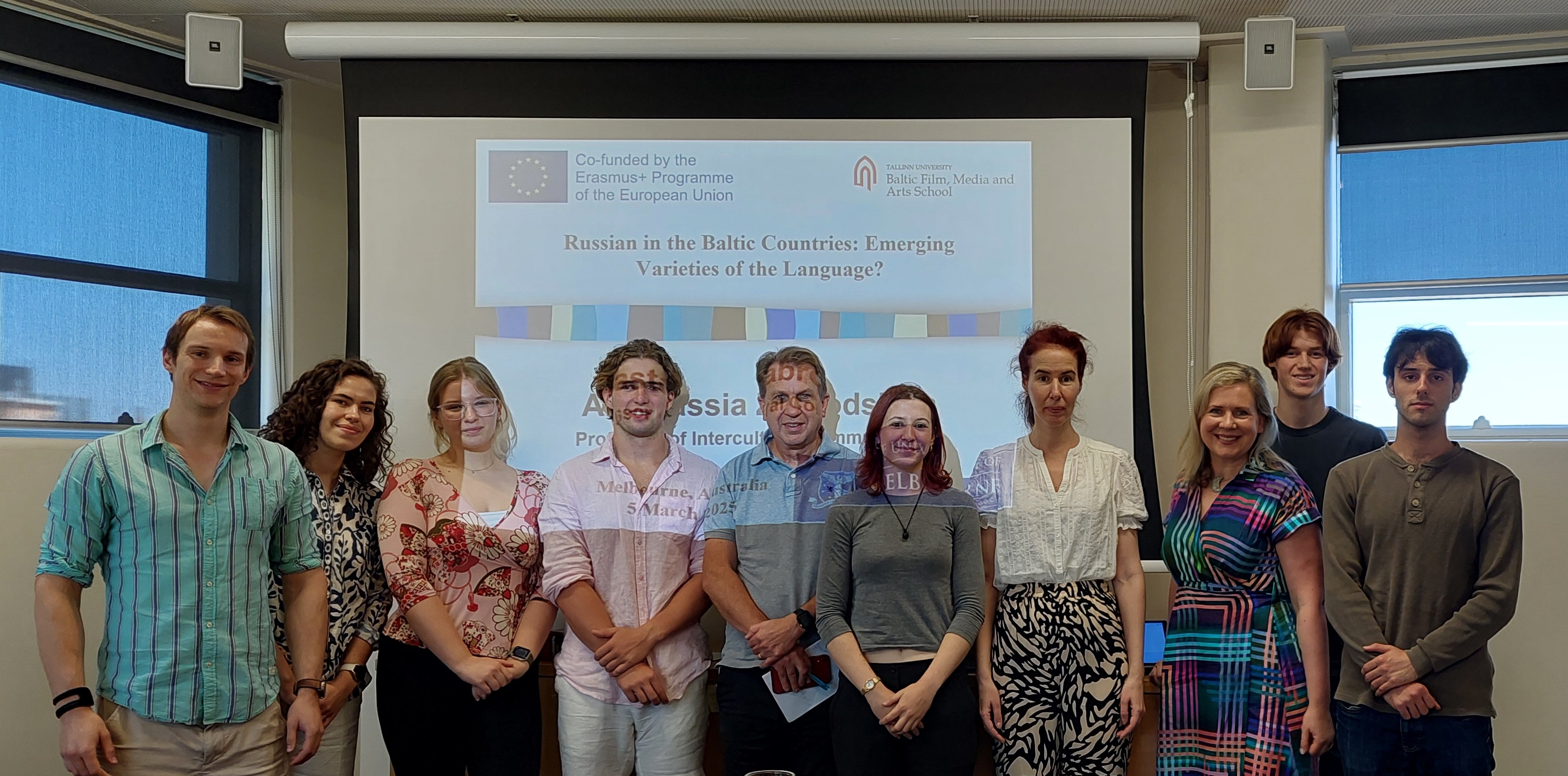Blossoming Connections: Professor Zabrodskaja’s Erasmus+ Visit from Estonia to Australia
Professor Anastassia Zabrodskaja successfully completed an Erasmus+ staff mobility program for teaching and training at the University of Melbourne, Australia. From February 28 to March 11, 2025, she delivered a series of guest lectures and participated in training activities focused on enhancing intercultural communication skills.

Her visit strengthened academic ties between Tallinn University and the University of Melbourne, fostering international collaboration and global knowledge exchange in intercultural communication, sociolinguistics, and bilingualism studies. Her lectures provided valuable insights into these fields, enriching the academic experience of both students and faculty members. In addition to her teaching commitments, Professor Zabrodskaja engaged in 12 days of training activities aimed at fostering global intercultural dialogue.
In her lecture From Monolingualism to Bilingualism: Identity Transformation and Linguistic Intuition through the Lens of Second Language Acquisition Theories, Professor Zabrodskaja explored the psychological and social aspects of bilingualism. She examined how individuals develop linguistic intuition while acquiring a second language and how this process influences their self-perception and cultural identity. Drawing on prominent second language acquisition theories, she illustrated how bilingual individuals negotiate multiple linguistic and cultural environments, reshaping their sense of belonging and communication strategies.

In Russian in the Baltic Countries: Emerging Varieties of the Language?, she analyzed the evolving linguistic landscape of Russian-speaking communities in Estonia, Latvia, and Lithuania. She examined how historical, political, and social factors have contributed to the emergence of distinct varieties of Russian in the Baltic region. Through case studies and linguistic analysis, she highlighted shifts in vocabulary and grammatical structures that reflect the unique sociolinguistic environments of these countries.
In What Happens When an Estonian Sociolinguist Enters the Linguistic Landscape in Brisbane, she shared her observations on multilingualism and language use in an Australian context. By analyzing Brisbane’s linguistic diversity, she offered insights into language contact phenomena, identity negotiation, and the impact of migration on linguistic landscapes. Her findings provided a practical perspective on language use in Australia, enriching discussions on global linguistic diversity.
Her lecture on Intercultural Competency and Global Citizenship, attended by 250 students, addressed the significance of cross-cultural understanding in today’s interconnected world. She discussed how developing intercultural competence enables individuals to engage meaningfully in diverse cultural contexts, emphasizing practical strategies for fostering open-mindedness, adaptability, and effective communication. The lecture underscored the essential role of global citizenship in promoting cultural appreciation and collaboration across borders.

Professor Zabrodskaja’s lectures significantly enriched academic discourse on intercultural communication, multilingualism, and sociolinguistics, fostering meaningful exchanges between scholars and students at the University of Melbourne. Her visit facilitated dynamic discussions on language diversity and intercultural communication, encouraging Australian university students to critically engage with real-world linguistic and social issues. Beyond the classroom, her interactions with faculty and researchers helped establish new avenues for collaboration, paving the way for potential joint research initiatives and academic partnerships.
Finally, in Shaping Language at Home: Family Policies, Beliefs, and Ideologies, she explored how family dynamics and societal policies influence language acquisition and maintenance. She examined how linguistic ideologies shape children's language development and how parental beliefs and broader socio-political frameworks impact bilingual and multilingual upbringing. The discussion emphasized the role of home language policies in preserving linguistic heritage and fostering language diversity in a globalized world.

This visit exemplifies the value of Erasmus+ cooperation in promoting international academic exchange, strengthening institutional ties, and advancing cross-cultural understanding in higher education. By bridging European and Australian perspectives on language and identity, this collaboration highlights the transformative potential of global academic mobility. Tallinn University remains committed to expanding its international network, fostering inclusive and interdisciplinary learning environments, and equipping students and staff with the skills to cope with an increasingly interconnected world.
The text is authored by Dr. Anastassia Zabrodskaja, who is a Professor of Intercultural Communication, the Head of the Master’s Program in Communication Management at Tallinn University Baltic Film, Media and Arts School, and the Executive Director of the European Masters in Intercultural Communication (EMICC) teaching and research network.
